 It's been a pretty decent couple of years for Ireland in film. First came the palm d'or winner The Wind That Shakes The Barley (a very good film, although it was the only English language film I've ever needed subtitles for), the the delightful musical Once and now, the best of the three, Steve McQueen's Hunger. This is the story of Bobby Sands and the hunger strike he organized at HM prison Maze in order to get IRA members treated as political prisoners. This is a brutal, uncompromising look at the strike, its causes and its effects. McQueen (I can't believe this is his real name) is a well-known, award-winning visual artist making his feature film debut here. The fact that the director is an actual artist is something you should keep in mind during this film. The framing on nearly every shot is clearly the work of a meticulous worker (while he doesn't take this to Kubrickesque levels, there are a couple shots, especially in the hallways of the prison that remind me of Kubrick). Playing Sands is Michael Fassbender, who has had a few small roles in the past, but nothing of this magnitude.
It's been a pretty decent couple of years for Ireland in film. First came the palm d'or winner The Wind That Shakes The Barley (a very good film, although it was the only English language film I've ever needed subtitles for), the the delightful musical Once and now, the best of the three, Steve McQueen's Hunger. This is the story of Bobby Sands and the hunger strike he organized at HM prison Maze in order to get IRA members treated as political prisoners. This is a brutal, uncompromising look at the strike, its causes and its effects. McQueen (I can't believe this is his real name) is a well-known, award-winning visual artist making his feature film debut here. The fact that the director is an actual artist is something you should keep in mind during this film. The framing on nearly every shot is clearly the work of a meticulous worker (while he doesn't take this to Kubrickesque levels, there are a couple shots, especially in the hallways of the prison that remind me of Kubrick). Playing Sands is Michael Fassbender, who has had a few small roles in the past, but nothing of this magnitude.As the film opens, we see a man look into a mirror and wash off his bloody knuckles. We don't know who he is at the time, but we later find out that he is a guard at the prison. He isn't a terrible guy, but we see him do bad things. His final scene is one of the most disturbing I've seen in recent years, but that doesn't come for a while. After we see him go through his day, a new prisoner comes in and refuses to wear his uniform. He is marked as insubordinate, and is forced to strip naked (this movie is not at all shy about nudity) before putting on a blanket (it was part of an ongoing protest). He gets to his cell and discovers that his cellmate had been smearing his shit on the walls as part of another ongoing protest. He doesn't seem to mind, and eventually joins in, but soon the guards come to wash them off. This is where we first meet Bobby. They drag him, kicking and screaming, from his cell, cut his hair and make him into a bloody mess. Even though he is the main character, this doesn't happen until thirty minutes into the film, although nearly no dialogue had been spoken through that point. Next, we get a virtuoso sequence in which, following a small riot, the guards march the prisoners out, send them through a gauntlet of baton-wielding riot police and then have them cavity searched, on-by-one, by a guy who never takes off his gloves. A large part of this is done in one take. Bobby is brutally beaten for not allowing the guards to search him, and we see the psychological effects of this on the guard who is forced to hit him. We don't really sympathize, but it's something. Next, after another moment of shocking violence, we get the film's centerpiece. Bobby has decided to organize a hunger strike, but unlike failed ones of the past, he organizes it so that they will die if their demands aren't met. Bobby lays all of this out in a seventeen minute conversation with a priest played by Liam Cunningham. What makes this conversation so notable is that the entire 17 minutes is done in a single take where the camera never moves. This is supposedly the longest single take in any feature film. After this, we flash to a few weeks later, and we see Bobby whithering down. There is little dialogue near the end, but the physical transformation is tremendous. Fassbender does a fantastic job of expressing every little emotion and pain that he must go through. We know from the outset that Bobby dies, but the brutality of the whole thing is shocking. Did he really accomplish anything? Was he a martyr or a rabble-rouser just trying to start a civil war?
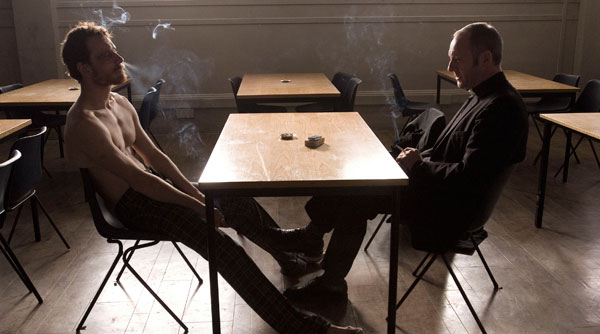
I don't know Bela Tarr's viewing habits, but if he watched this film I'm sure he was proud. The master of the long take's old joke that the 12 minute reel is a form of censorship seems to have been disproved (I'm not entirely sure how they did it). The 17 minute conversation, despite simply being a static camera focused on two men is one of the most charged and tense in recent years. it speaks mainly to the immense talents of the two actors, but also to the film around it. Before this take, there had been very little dialogue. In fact, I'd say at least 75% of the dialogue in the 90 minute film comes in this one take. It's so new and unexpected that we get dragged in and we never leave. The conversation switches between comic statements on the nature of the priesthood to questions of the morality of Bobby's actions with ease, and we completely buy it. Fassbender and Cunningham lived together for weeks, rehearsing 15-20 times a day, to be able to get everything just right, and its worth it.
Like The Wind That Shakes The Barley, this film may be a little to obvious in its politics. The use of Margret Thatcher sound-clips may be a bit over the top, but that film's biggest failing was its complete lack of humanization of the British. here' we know that the guard at the beginning probably isn't a bad guy, and the guard who beats Sands is distraught over it. It isn't much, but acknowledging the humanity of the other side is an important step to avoid seeming to flat and one-sided. The film's final moments have also drawn some criticism, with some saying that the final moments make him too much of a Christ-like figure, but that was set up from the beginning (his long hair and beard at the beginning are very reminiscent of The Passion), so I don't really mind. This film sets up McQueen as a filmmaker to watch and will hopefully draw attention to the issues in Ireland. Whatever side you're on, they aren't finished yet.
Rating (Out of ****): ****

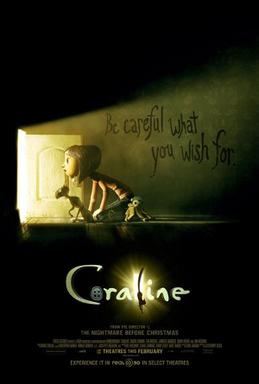
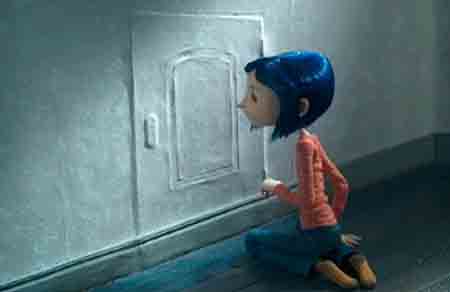
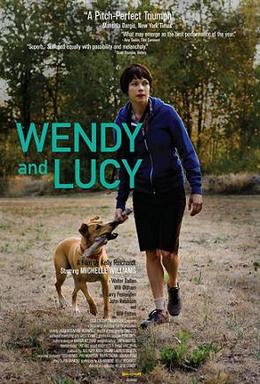
 As a preface to this review, I should probably note that I am a non-practicing Jew who has spent a decent amount of time in Israel and has many friends currently in the Israeli army. I say this because these facts made it very difficult to simply review Ari Folman's Waltz with Bashir on an intellectual level. This was one of the most emotional movie-going experiences I've ever had. This animated documentary (I'll get to that later) is one of the most highly acclaimed films in Israeli history, and was one of my most anticipated films of 2008. It has already won the Golden Globe for best foreign language film and is the front-runner for the Oscar in that category as well as a dark horse in the best animated feature category (although I'd be shocked if anything actually beat Wall-E). When I first heard that this was an animated documentary, I really didn't know what to think. It just sounded like too much of a contradiction, unless you count an animated educational film as a documentary. Waltz With Bashir has advertised itself as the first feature-length animated documentary, and, given the way it is filmed, I agree with that label. The film is centered around a series of interviews and discussions between Folman and others who were with him in the 1982 war with Lebanon. These sequences were first filmed in a studio, and then the animators drew them separately (it was not rotoscoped, like Waking Life or A Scanner Darkly, which is where they animate over the actual image). Then their interviews lead to a story of flashbacks and hallucinations about the war. At first I didn't realize how these could be considered part of a documentary, but I realized that they are no different from the reenactments in The Thin Blue Line, except in that they use a separate medium.
As a preface to this review, I should probably note that I am a non-practicing Jew who has spent a decent amount of time in Israel and has many friends currently in the Israeli army. I say this because these facts made it very difficult to simply review Ari Folman's Waltz with Bashir on an intellectual level. This was one of the most emotional movie-going experiences I've ever had. This animated documentary (I'll get to that later) is one of the most highly acclaimed films in Israeli history, and was one of my most anticipated films of 2008. It has already won the Golden Globe for best foreign language film and is the front-runner for the Oscar in that category as well as a dark horse in the best animated feature category (although I'd be shocked if anything actually beat Wall-E). When I first heard that this was an animated documentary, I really didn't know what to think. It just sounded like too much of a contradiction, unless you count an animated educational film as a documentary. Waltz With Bashir has advertised itself as the first feature-length animated documentary, and, given the way it is filmed, I agree with that label. The film is centered around a series of interviews and discussions between Folman and others who were with him in the 1982 war with Lebanon. These sequences were first filmed in a studio, and then the animators drew them separately (it was not rotoscoped, like Waking Life or A Scanner Darkly, which is where they animate over the actual image). Then their interviews lead to a story of flashbacks and hallucinations about the war. At first I didn't realize how these could be considered part of a documentary, but I realized that they are no different from the reenactments in The Thin Blue Line, except in that they use a separate medium.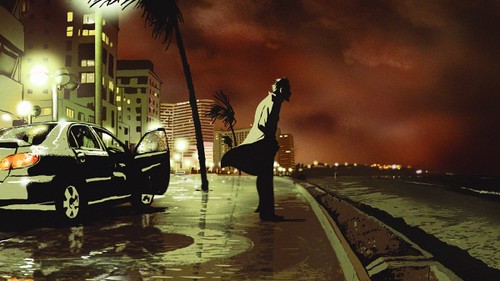 As the film opens, Folman sits in a bar with an old friend from the war who explains a recurring dream in which he is chased down the street by 26 angry dogs. In Lebanon, they knew he couldn't kill humans, so his commanders made him kill the guard dogs instead, and he sees this recurrent nightmare as his punishment. After this interviews, Folman realizes that he doesn't remember a thing about the war except for one hypnotic flashback where he and two others wake up in the ocean and walk into Beirut, only to see a large crowd fleeing the Sabra and Shatila massacres, in which a large group of Christian Lebanese entered two Palestinian refugee camps and slaughtered the refugees while the Israeli guards just stood by, paralyzed by the chain of command. Folman goes to interview one of the men who was in the dream (he can't remember the other), and, through interviews with him and various others who were there in that time, he begins to put together what happened. Through this, we get a series of fascinating, interconnected vignettes about the war and its effect on people. The only one of these that doesn't work perfectly involves Folman working a VCR so his colonel can watch porn; however this is soon followed by the best scene in the film. As they entered Beirut following the assassination of Lebanese leader Bachir Gemayel (pronounced Bashir), Folman's company faced heavy enemy fire. After a few minutes, his commander knew that they needed to cross the street, so he grabbed a heavy machine gun and walked out, shooting into the air, performing a crazed Waltz amid the gunfire and posters of the fallen leader. Near the end of the film, there is an abrupt switch from animation to archival footage. This scene, aside from showing the true effects of war in far greater detail, perfectly uses the dreamlike imagery of animation to contrast the real, and reminds us of the line between dream, memory and fact.
As the film opens, Folman sits in a bar with an old friend from the war who explains a recurring dream in which he is chased down the street by 26 angry dogs. In Lebanon, they knew he couldn't kill humans, so his commanders made him kill the guard dogs instead, and he sees this recurrent nightmare as his punishment. After this interviews, Folman realizes that he doesn't remember a thing about the war except for one hypnotic flashback where he and two others wake up in the ocean and walk into Beirut, only to see a large crowd fleeing the Sabra and Shatila massacres, in which a large group of Christian Lebanese entered two Palestinian refugee camps and slaughtered the refugees while the Israeli guards just stood by, paralyzed by the chain of command. Folman goes to interview one of the men who was in the dream (he can't remember the other), and, through interviews with him and various others who were there in that time, he begins to put together what happened. Through this, we get a series of fascinating, interconnected vignettes about the war and its effect on people. The only one of these that doesn't work perfectly involves Folman working a VCR so his colonel can watch porn; however this is soon followed by the best scene in the film. As they entered Beirut following the assassination of Lebanese leader Bachir Gemayel (pronounced Bashir), Folman's company faced heavy enemy fire. After a few minutes, his commander knew that they needed to cross the street, so he grabbed a heavy machine gun and walked out, shooting into the air, performing a crazed Waltz amid the gunfire and posters of the fallen leader. Near the end of the film, there is an abrupt switch from animation to archival footage. This scene, aside from showing the true effects of war in far greater detail, perfectly uses the dreamlike imagery of animation to contrast the real, and reminds us of the line between dream, memory and fact.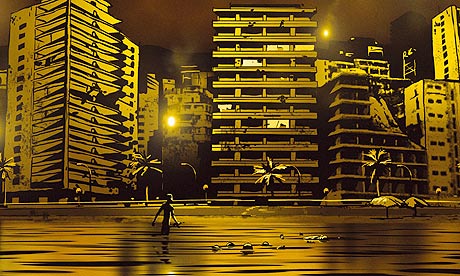 I really can not express my admiration for this film enough. Every little detail was alternatively fascinating and heartbreaking. The animation was both dreamlike and beautiful, perfectly capturing the feel and the themes of the film. The score, which won composer Max Richter best composer at the European film awards, is occasionally overbearing, but otherwise perfect, especially during the main hallucinatory sequence. Folman is a perfect guide for this journey, always allowing the story to come out on it's own, and the interviewees, from his friends to the reporters to the military higher-ups at the end, all give us the exact piece of the puzzle that we need from them. My emotional connection to the people and places in the film certainly helped my personal reaction to the story. I can't deny that, but this is an important film, especially now, and it is something that everyone should see. Waltz with Bashir really is one of the best and most innovative films of 2008.
I really can not express my admiration for this film enough. Every little detail was alternatively fascinating and heartbreaking. The animation was both dreamlike and beautiful, perfectly capturing the feel and the themes of the film. The score, which won composer Max Richter best composer at the European film awards, is occasionally overbearing, but otherwise perfect, especially during the main hallucinatory sequence. Folman is a perfect guide for this journey, always allowing the story to come out on it's own, and the interviewees, from his friends to the reporters to the military higher-ups at the end, all give us the exact piece of the puzzle that we need from them. My emotional connection to the people and places in the film certainly helped my personal reaction to the story. I can't deny that, but this is an important film, especially now, and it is something that everyone should see. Waltz with Bashir really is one of the best and most innovative films of 2008.